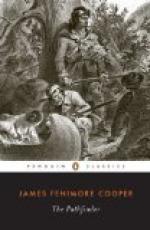“I fear I understand you only too well, June. Do you wish to see my father?”
“No here; gone away.”
“You cannot know that, June; you see the island is full of his soldiers.”
“No full; gone away,” — here June held up four of her fingers, — “so many red-coats.”
“And Pathfinder? would you not like to see the Pathfinder? He can talk to you in the Iroquois tongue.”
“Tongue gone wid him,” said June, laughing; “keep tongue in his mout’.”
There was something so sweet and contagious in the infantile laugh of an Indian girl, that Mabel could not refrain from joining in it, much as her fears were aroused by all that had passed.
“You appear to know, or to think you know, all about us, June. But if Pathfinder be gone, Eau-douce can speak French too. You know Eau-douce; shall I run and bring him to talk with you?”
“Eau-douce gone too, all but heart; that there.” As June said this, she laughed again; looked in different directions, as if unwilling to confuse the other, and laid her hand on Mabel’s bosom.
Our heroine had often heard of the wonderful sagacity of the Indians, and of the surprising manner in which they noted all things, while they appeared to regard none; but she was scarcely prepared for the direction the discourse had so singularly taken. Willing to change it, and at the same time truly anxious to learn how great the danger that impended over them might really be, she rose from the camp-stool on which she had been seated; and, by assuming an attitude of less affectionate confidence, she hoped to hear more of that she really desired to learn, and to avoid allusions to that which she found so embarrassing.
“You know how much or how little you ought to tell me, June,” she said; “and I hope you love me well enough to give me the information I ought to hear. My dear uncle, too, is on the island, and you are, or ought to be, his friend as well as mine; and both of us will remember your conduct when we get back to Oswego.”
“Maybe, never get back; who know?” This was said doubtingly, or as one who lays down an uncertain proposition, and not with a taunt, or a desire to alarm.
“No one knows what will happen but God. Our lives are in His hands. Still, I think you are to be His instrument in saving us.”
This passed June’s comprehension, and she only looked her ignorance; for it was evident she wished to be of use.
“Blockhouse very good,” she repeated, as soon as her countenance ceased to express uncertainty, laying strong emphasis on the last two words.
“Well, I understand this, June, and will sleep in it to-night. Of course I am to tell my uncle what you have said?”
The Dew-of-June started, and she discovered a very manifest uneasiness at the interrogatory.
“No, no, no, no!” she answered, with a volubility and vehemence that was imitated from the French of the Canadas; “no good to tell Saltwater. He much talk and long tongue. Thinks woods all water, understand not’ing. Tell Arrowhead, and June die.”




